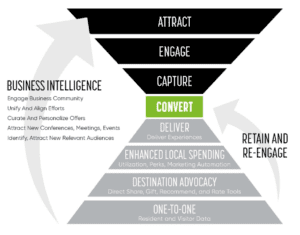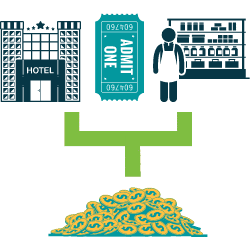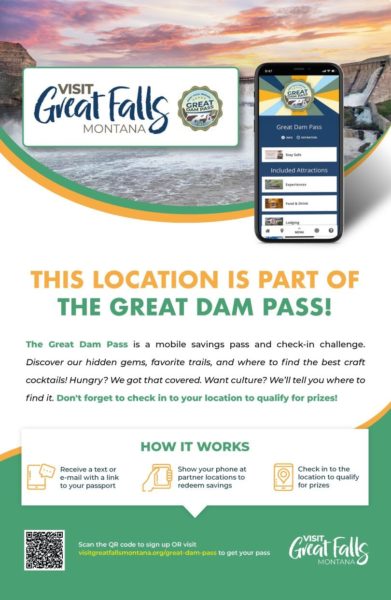Now’s the Time for DMOs & CVBs To Think Differently: Technological Advancements and Channel Selling to Enable Travel Recovery
Destination marketing organizations (DMOs) and Convention and Visitors’ Bureaus (CVBs) have long been the marketing engine for cities and regions (most destinations just have one of these organizations – the name CVB pre-dates DMO, but they’re essentially the same kind of entity). Primarily nonprofit, government organizations, they have been funded almost entirely by taxes collected on hotel stays. You know – that extra amount at the bottom of your bill when you go to checkout? This model has worked sufficiently in many markets…until COVID created a near-drought in hotel revenue. But the model also created a skewed approach to marketing, one that favored promoting lodging over the actual activities that many visitors to a region came to do in the first place. With hotel revenues dried up, DMOs and CVBs themselves are struggling. Many have had to make huge cuts in workforce, all at a time when so many of their local businesses need more support than ever. Now is a crucial time for DMOs and CVBs to problem-solve for the survival of their entire market, and one big way they can do so is by thinking differently and diversifying their revenue sources.
We decided to discuss our sentiments with the CEO of Bandwango, Mo Parikh. Bandwango, a Redeam partner company, is a travel technology platform that empowers destination promoters to offer dynamically curated, digitally delivered experience passports.
Redeam: In this crucial time, as travel-dependent businesses attempt to survive and recover, what should DMOs and CVBs be doing to help these businesses in a time of staycations, when fewer people are even staying in hotels?
Mo Parikh: Traditionally, DMOs and CVBs were created to attract out-of-town leisure and business visitors who would come into their cities, stay in their hotels, attend their conventions, and see their top attractions. The thing that COVID has done for DMOs and CVBs – and we’re seeing this across the board – is surface the notion that a destination’s locals are just as powerful a force as their visitors are, and more to the point, they’re the best investment in marketing that the DMO or CVB can make at this moment.

Redeam: Can you talk a little bit more about that consumer journey?
Mo: Yes. Largely, DMOs/CVBs have been focused on the top of the consumer funnel. They have fantastic websites, generate incredible content, and they’re generally viewed as the local domain authority in these cities. They have incredible power over potential visitors during the inspiration phase. What DMOs haven’t really taken ownership of is bottom of the funnel actions like conversion and its measurement, which they typically leave up to a third party, whether that’s an OTA or an activity provider.
But now, that mentality is shifting and with it comes more and more DMOs who are spearheading the development of unique experiences within their destinations. Right now, the primary goal of these experiences is to engage locals and encourage them to spend money with tourism-dependent businesses. For many of our clients, visiting friends and family are a top driver of tourism, so this strategy also has a positive long-term effect. Ideally, once the local enjoys one of these in-market experiences, when their friends or family do travel again to visit them, the local is much more likely to take their visitors back to these experiences. This a real shift in perspective: repeat business isn’t going to come from a one-time visitor to your destination, but it is going to come from your locals.
Redeam: In this digital age of ours, isn’t the notion of “turning your audience into your champion” one that’s been around a while already?
Mo: True, but look at where a significant amount of DMO/CVB funding comes from – from hotel tax, which is largely out-of-town visitors coming into the city. From my perspective, the limitation has mainly been political. I think that a lot of DMOs know that word-of-mouth is huge, but they need to satisfy their key stakeholders – largely the hoteliers – and if the DMO doesn’t deliver upon the promise behind that funding, in the back of their minds they’re always worrying, “Are we going to get cut off?” Now, we’re seeing local economies hurt, which is never good, but in some ways DMOs are finally getting to show that their expertise goes beyond just generating room nights. They’re being looked to as drivers of the local economy, which is what they’ve been this entire time. The difference being that for many organizations this is the first time those other KPIs are being given as much weight as room nights.
Redeam: This going to be really valuable over the long term because in any market, the diversity of experiences to be had (and the impact on that market’s economy) come from all of the activity and attraction operators, not from the hotels. And now with mobile devices and prior to COVID, people don’t even use hotel concierges anymore. They just Google search, find what they want, get directions on how to get there, and go! So it behooves DMOs even more to provide value to these local businesses in order to provide more value to their own economy.
Mo: Right; this pivot inherently strengthens the DMOs’ relationships with local businesses. Membership, while a small component of a DMO’s revenue, is still a component, and a lot of times the local businesses paying for this membership question, “What am I getting for this?” At Bandwango, we enable DMOs with reporting that clearly shows people driven through the doors of these local businesses. By reporting that to members, the value can become completely apparent to them.
Redeam: What we’ve traditionally seen from local businesses in their respective markets is that they pay for their DMO membership not because they necessarily expect to be promoted, but for the opportunity to network with their peers and to have a sense of tourism community within their market.

Redeam: So, what should DMOs and CVBs focus on right now? How should they prioritize their efforts (and their marketing)?
Mo: If DMOs and CVBs can serve their mission of promoting a destination and supporting all their local businesses dependent upon tourism, but do so more effectively and with more quantifiable metrics to show their impact, that could open up discussions with the governing body of alternative revenues sources that aren’t solely reliant on a tax – for example, TID (Tourism Improvement District).
Now is a super-strong time for DMOs to get their footing back underneath them and show how they do serve local communities. Think of it like a future testimonial. Every community’s tourism-dependent businesses are hurting. Helping business owners during a time of need will put DMOs in a better position with their communities long after they’ve recovered.
Redeam: But how does this idea jibe with the way DMOs and CVBs historically have generated their funding, i.e. through hotel tax? And while the DMO hotel tax revenue is now gutted by the pandemic, is now the time to re-think revenue streams?
Mo: Many DMOs and CVBs have shifted their focus to driving customers through the doors of their local businesses. My argument is that they should continue to focus on this once their hotels start to fill up again and visitors return. I’m not saying DMOs should stop trying to fill hotel rooms – nothing will replace the hotel occupancy tax (HOT) and effect of meetings & conventions as a source of revenue – but this is a great opportunity to showcase the impact the tourism industry has on local economies even without the benefit of visitors. Visitors who stay with their families, daytrippers and locals all have value that should not be ignored and cannot be quantified with HOT. I think reframing the conversation to include those groups is worthwhile.
Redeam: SO MANY businesses are affected by the lack of tourism now, but it’s almost invisible to the average consumer who doesn’t realize the impact of tourism on its local economy…unless you’re in this business. On the other hand, as opposed to the turn-off of, say, a $20.00 hotel tax on a weekend stay, isn’t it better and easier for DMOs to help create visitor products or packages where that cost is already built into the overall price of the product?
Mo: Without question. And from the visitor’s perspective, they don’t need to have this kind of offering itemized. They want the convenience of buying an off-the-shelf destination package that gives themselves or their family a great experience. DMOs and CVBs are traditionally not for-profit organizations, but when DMOs develop these kinds of packaged experiences, they can start to see what it’s like to think like a profit-driven organization.

Redeam: So, what’s the sense of urgency by DMOs and CVBs for new solutions right now? What are you guys seeing?
Mo: The urgency is definitely there because of the overarching circumstances but also because DMO staffs have been widely reduced. DMOs are now looking to work with vendors who can help alleviate staffing concerns. Bandwango is able to provide that because we’re a full operational partner, not just a technology company. We manage merchant onboarding, customer service, accounting, and pass build-out. We run a lot of different kinds of programs, but on average it takes us about 60 days to get a pass up and running.
Redeam: How do DMOs get in their own way? Is it a fear and control issue, like fear of failure or fear of Boards? What are their obstacles to solutions like this?
Mo: The idea of owning the customer journey and shifting the goal post from room nights to overall economic impact is such a departure from what they’ve traditionally been doing. DMO staffs are so creative, and I’ve found that they’re really up to try anything, but I think there’s a fear of perception. How can you justify spending dollars on a local initiative after visitors start coming back? How can you communicate the value of a visitor if you don’t have their room night tax? You can’t address those concerns if your revenue is only coming from one place. You can’t overcome those obstacles until you get stakeholders on board with new and diverse KPIs. Those are big obstacles, and I think what DMOs and CVBs need to do right now is recognize and acknowledge all of these constraints and be willing to think differently.
Redeam: Thanks so much for sharing all this insight with us, Mo!
Mo: It’s been my pleasure! Thanks for asking so many great questions! I hope this helps illuminate more value for the entire marketplace of local and regional travel right now.
About Redeam
Redeam (www.redeam.com) is a Boulder, CO-based SaaS solutions business that works with integration partners such as Bandwango to empower the growth of tours, attractions, and activities so that more people can enjoy the world. Redeam is the only global technology company with an agnostic channel manager solution connecting local and regional market-wide Supply and Demand of the Experiences sector of travel. Redeam’s middleware solutions and touchless technologies enable the seamless and automated passing of product and booking data back and forth between Operators and Distributors, thereby enabling increased consumer awareness, the sale of more tickets, a better check-in process for guests, elimination of operational strain caused by too many manual processes or fraud, and improves payment reconciliation timelines. For its innovative solutions, Redeam has garnered over nine accolades and awards including PhocusWire’s Top 20 Start Up’s to Watch for 2019 and the 2018 Future Travel Experience Startup Competition Winner. The company works with hundreds of resellers and partners such as jetBlue Travel, Groupon, and Expedia, and serves thousands of attraction and activity operators globally like Walt Disney World, BigBus Tours, Boston Harbor Cruises, and the Intrepid Sea, Air & Space Museum. Redeam also hosts a free Experiences Industry Online Glossary.
About Bandwango
Bandwango (www.bandwango.com) is a technology company based out of Murray, Utah with more than 150 Destination Marketing Organization (DMO), Convention & Visitor Bureau (CVB), and other clients across the United States and Canada. Bandwango’s signature product, the Destination Experience Engine (DXE), enables clients to curate free and paid experiences into passports, trails and marketplaces designed to deliver the best tickets, tours and savings to locals and visitors alike. DXE is an end-to-end solution that combines anywhere merchant and inventory management, redemption technology, white-labeled mobile web application delivery, customer service, managed accounting, and true economic impact data to provide a seamless solution to destination marketing organizations, associations and other industry partners. Watch how Bandwango helped save Iowa State Parks 100th Anniversary celebration from COVID decimation:

